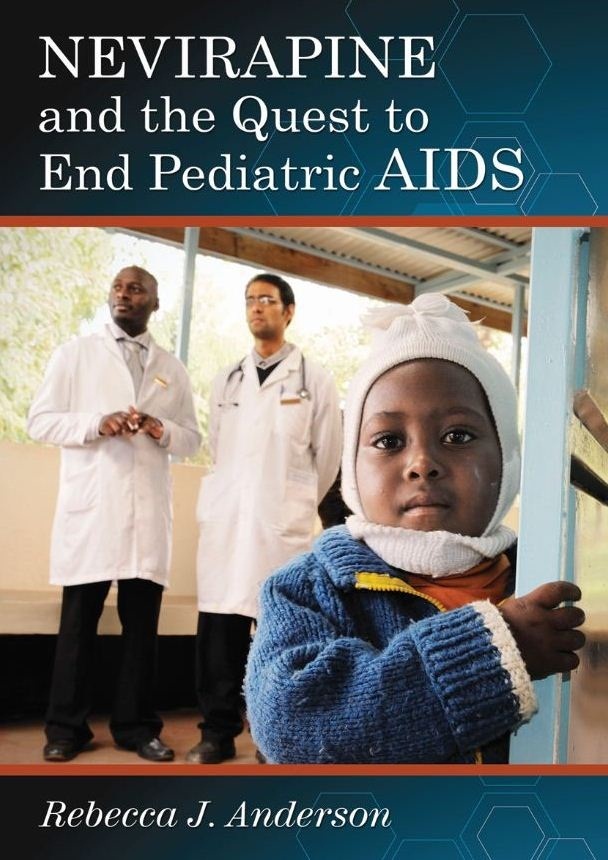After a robust career as a pharmacologist, author Rebecca Anderson decided to pivot and pursue her lifelong dream of becoming a full-time writer. Her second book, titled “Nevirapine and the Quest to End Pediatric AIDS,” traces the journey of the antiviral drug that “changed the face of AIDS globally,” and its impact on pediatric HIV.
Nevirapine was a game-changer because it was the first in an early class of antiretroviral drugs (ARVs) that proved to be effective in reducing HIV viral load without the host of side effects that accompanied drugs like AZT. What’s more, the drug’s single-dose regimen, which investigators discovered could prevent HIV transmission to babies, was relatively inexpensive and could be implemented throughout the world.
Anderson spent more than eight years as a pharmaceutical researcher and developer for Boehringer Ingelheim (BI) Pharmaceuticals, the drug company that manufactured Nevirapine. Though she didn’t consult directly on the project, she witnessed the development of the antiretroviral drug from conception through fruition, and decided to channel her fascination with the medication into her second book.
But as she delved deeper into her research, Anderson said she realized a key piece of the narrative was missing – children.
Drug companies “were focused on adults dying from AIDS, (they) weren’t focused on children,” Anderson said. “Plus, no one in their wildest dreams thought you could prevent infections of the virus, it wasn’t on their radar. I wanted to show how those two paths converged.”
That desire guided her to the HIVNET 012 clinical trial and the Elizabeth Glaser Pediatric AIDS Foundation (EGPAF).
The HIVNET 012 clinical trial was designed to test the efficacy of Nevirapine and AZT in preventing mother-to-child transmission (PMTCT) of HIV. The randomized trial gave some participants a single dose of Nevirapine during labor, and a dose of the liquid formulation of the drug to babies after birth. Researchers would evaluate the efficacy of Nevirapine, compared to the babies who received AZT for seven days.
“Lo and behold, Nevirapine worked. It worked remarkably well,” Anderson said. “I talked to a number of people and they remembered exactly where they were when they heard the results of that trial – even now. One physician told me that discovery changed the face of AIDS globally.”
The clinical trial was led by Laura Guay, M.D., who now serves as EGPAF’s vice president of research. Anderson said her interviews with Dr. Guay formed a pivotal point in the progression of the story.
“When I laid out how I wanted to tell the story in my book, I realized that what I wanted to do was carry the readers along parallel paths chronologically: how the drug was discovered and developed, and Elizabeth Glaser’s story — how she got infected, how she infected her children, and her advocacy for pediatric AIDS research,” Anderson said.
“Those tracks moved along in time independent of each other and really there was no connection” until the HIVNET trial.
Anderson said the U.S. Food and Drug Administration (FDA) compelled the BI team to develop a pediatric formulation of Nevirapine and conduct pediatric trials because of Elizabeth Glaser’s tireless advocacy.
The main reason the FDA advised pediatric clinical trials was because of Elizabeth’s insistence, Anderson said.
Many drug companies “had never done a pediatric clinical trial — ever. To have them spin around and make that commitment was not a trivial thing.”
“Without EGPAF none of this would have happened. Nevirapine, BI’s pediatric formulation, and HIVNET 012 revolutionized the treatment paradigms, especially for children.”
Because of its simplicity and efficacy, single-dose Nevirapine launched PMTCT programs throughout the developing world, especially in regions that had previously been inaccessible to HIV/AIDS health care.
“Nevirapine and the Quest to End Pediatric HIV” is an historical account that traces the story of pediatric HIV prevention and treatment through the eyes of individual children, physicians and families affected by the epidemic.
“Nevirapine is not a perfect drug, but it came along at a pivotal time, made a tremendous impact. It made a lot of other things possible,” Anderson said.
“Children and adults still get AIDS and still get infected, they have to take drugs every day and those drugs still have side effects. This is still a very serious issue and one that needs to get more visibility.”
Rebecca Anderson has more than 25 years of experience in the field of pharmacology and published numerous articles in medical journals throughout the course of her career. Her latest book, “Nevirapine and the Quest to End Pediatric AIDS,” is available to purchase through McFarland Publishing, and Amazon.com.




